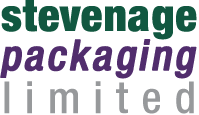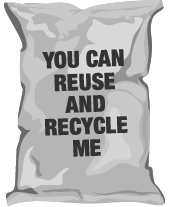Common Myths about Plastic Bags
Reusable Bags
MYTH: The prevailing environmental opinion is that heavyweight canvas, cotton, and polypropylene reusable bags are the best choice to replace plastic bags.
TRUTH: Reusable bags have their uses. The environmental impact has not been properly studied, however it is widely accepted that these so called 'reusable bags' are not being used for the myriad of wide uses that disposable bags provide.
Where disposable bags are not available at checkouts, customers will purchase secondary bags for waste and rubbish bin liners.
Most of these heavyweight reusable / bags for life are manufactured in the Far East and often shopped halfway around the world before we get to use them having a significant impact on the carbon footprint with shipping and transportation oil, diesel pollution.
A typical plastic supermarket bag weighs 8g and can be re-used many times. It can also be recycled into everything from black bin bags to weatherproof park benches and council litter bins.
A typical cotton bag weighs 87g. Think about the carbon footprint of shipping ten times the weight of bags across the globe.
David Santillo, Marine Biologist - Greenpeace
Paper Bags are Better
MYTH: Many people believe that paper bags are a better environmental choice than plastic.
TRUTH: Paper bags, even recycled ones, require many times more energy to produce than plastic. Paper production and recycling also produces far more air and water pollution than plastic. And because paper bags weigh nearly 10 times that of plastic bags, they require 10 times the fuel to transport.
Paper bags can also be easily contaminated with oils, grease, and food waste that can contaminate entire batches of recycling. Plastic bags can be cleaned prior to recycling to eliminate contaminants.
Charlie Mayfield, Chairman of John Lewis PLC
Landfills
MYTH: Landfills are overflowing with plastic bags.
TRUTH: Plastic bags are easily recycled, but even if they do end up in a landfill, they take up a small fraction of one percent of landfill space. The average person uses about 326 plastic grocery bags per year, which by weight is about 3 pounds. By comparison, the average person generates nearly 1000 pounds of waste each year.
This works out at a measly 0.01% of each individuals waste every year.
The major contributor to landfills is paper, wood and construction debris. Banning or taxing plastic bags would mean that more paper bags would get used, resulting in more waste going to the landfill.
Bob Beynon
Litter
MYTH: Plastic bags are a major source of litter, and banning or taxing bags will reduce litter.
TRUTH: Plastic bags make up less than 1 percent of all litter. Cigarette butts, fast food packaging, and food wrappers are much larger contributors. Banning one item that becomes litter does nothing to change the mindset of those that discard trash improperly. Many of the bags that end up as litter blow off of garbage trucks or out of landfills. Landfill operators and garbage haulers should be held accountable for items that escape containment.
Since plastic bags are responsible for less than 1% of all litter, banning or taxing them will have no impact. The solution to litter is public education, recycling programs, and proper disposal.
Professor Geoff Boxshall, Marine Biologist - Natural History Museum
CBC Chairman, Paul Marmot
Marine Wildlife Tangled in Bags
MYTH: "Over 100 thousand marine animals die from becoming tangled in discarded plastic bags each year."
TRUTH: The report that this myth was based on (a Canadian study from 1987) didn't mention plastic bags at all. In 2002 the Australian Government commissioned a study on plastic bags, and the authors misquoted the 1987 study. What the original study found was that between 1981 and 1984 over 100 thousand marine mammals and birds were killed by being caught in discarded fishing nets and lines.
Furthermore, the National Oceanic and Atmospheric Administration (NOAA) has stated that it is unable to find studies to support many of the statements that assert plastic bags cause harm to marine wildlife and that many quotes about plastic marine debris are false, unproven or exaggerated.
Recycling
MYTH: Recycling plastic bags is extremely costly and difficult.
TRUTH: Recycling programs are growing all the time, and plastic recycling is actually a very simple, cost effective and energy efficient process. The main products currently made from recycled grocery bags is black refuse sacks and new bags.
Ireland's Bag Tax
MYTH: Ireland's 2002 tax on plastic grocery bags reduced plastic bag use by 90%.
TRUTH: This is partially true, but doesn't tell the whole story. Use of plastic grocery checkout bags declined, but sales of packaged plastic bags went up by about 400%, resulting in a net gain in plastic bags going to landfills. This shows that most people were reusing their plastic grocery bags for tasks where plastic bags are the best solution - trash can liners, picking up after the dog, wet garbage, etc.
Carrier bag taxes could have a seriously negative effect on the environment by encouraging the use of other less environmentally acceptable alternatives and by increasing - not decreasing - the purchase of plastics bags (such as bin liners) which has happened in Ireland.
Single Use
MYTH: Most proposed bag bans and taxes use statistics based on an assumption that plastic bags are only used once.
TRUTH: Studies have shown that 80-90% of the population reuse plastic grocery bags at least once. As waste bin liners, for picking up after pets, as lunch sacks, holding wet laundry, etc. Plastic bags are also very easy to recycle, and most grocery stores provide bag recycling bins.
Oil Consumption
MYTH: According to many websites and environmental groups, plastic bag manufacturing uses a large percentage of the crude oil. Some suggest that eliminating plastic bags would reduce our dependence on oil.
TRUTH: In America plastic bags are made from natural gas, NOT oil. 85 percent of the raw material used to make plastic bags is produced from natural gas.




